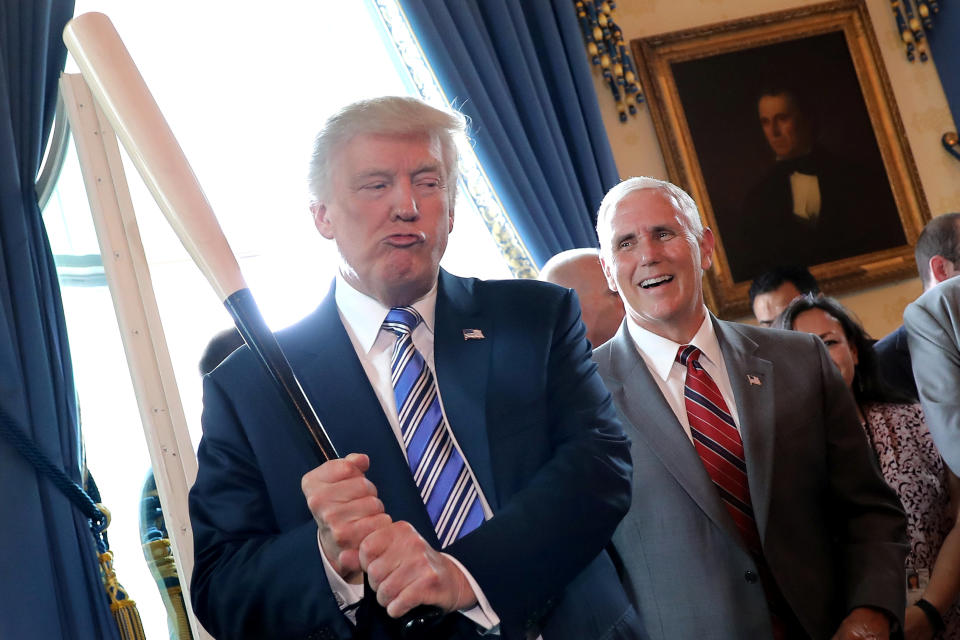Trump's new Obamacare cut is timed for maximum destruction
On Thursday, President Donald Trump announced that his administration would discontinue subsidies for insurance to lower-income individuals under the Affordable Care Act, known widely as Obamacare. Without these subsidies, costs for millions of Americans will rise.
The timing of Trump’s decision, one that he has been teasing for months, could not come at a worse time for the health care system. At the end of September, states finalized their deals with insurance companies for 2018 — signing contracts to lock in premiums — and open enrollment begins in just over two weeks, a time where millions of consumers will buy plans for 2018.

“The timing is really unfortunate,” Sabrina Corlette, a professor at the Georgetown’s Center on Health Insurance Reforms, told Yahoo Finance. “It’s very late in the process.”
The news has not been well received by any stakeholders in the industry, including insurers, doctors, patients, or hospitals. And insurance stocks tanked following the announcement.
“There’s no question that the actions of the past 24 hours are driven more by a political animus and less about the best policy for millions of consumers who are buying insurance,” she said.
Insurers’ insolvency risk skyrockets should losses be significant in 2018
Some insurers may try to change the final rates for 2018 in light of Trump’s latest move to cripple — or sabotage, as many have called it — the Affordable Care Act. A rate change at this late state, could push back open enrollment and cause chaos, and likely be impossible due to contracts already in place.
According to Corlette, it’s “conceivable” that some states and insurers might be able to re-negotiate rates.
“We are living in unusual times — you have state based marketplaces with a lot more autonomy,” she said. “But the feasibility of making these changes? i struggle to envision how it’s possible.”
Many states did require or allow insurers to price in the possibility that Trump would discontinue these subsidy payments, called cost-sharing reduction payments or CSRs. But about a dozen states did not allow insurers to price this in and will likely face heavy losses.
“If the losses are substantial it could tip some of them into insolvency,” said Corlette.
‘It’s gonna be messy’
Other insurance carriers might try to exit the market, faced with that scenario, a move that would result in copious lawsuits, gaps in coverage, and a lack of health care.
“They’ve all signed a contract committing to 2018 participation, said Corlette. “The question comes: Can they break the contact in light of the policy changes? With this administration, they could fight them on it. Either way it’s gonna be messy.” Should significant lawsuits ensue, the prayers for relief will be staggering. “They will be some of the largest, dollar wise, that the United States has ever seen,” Nicholas Bagley, a professor at University of Michigan and health policy expert tweeted.
For consumers, marketplace silver plans would “rise by about 20%” and “slightly more in later years” without these CSR subsidies, according to the Congressional Budget Office. The reason they would not rise further is because ACA tax credits increase with the size of these premiums, a fact that neuters much of the savings on the federal government’s part.
Politically, the move is being interpreted as a message to a Congress that did not repeal or replace the Affordable Care Act’s health care system. With his latest moves to set the system on fire, Trump is prodding Congress to be the fire department: to either appropriate these subsidies themselves or create repeal and replace. But given that health care policy often takes years to hammer down, consumers will likely be caught in the crossfire.
“We’re just a couple weeks away from open enrollment and it’s a life or death issue for millions of consumers,” said Corlette. “It’s a very frightening moment.”
Ethan Wolff-Mann is a writer at Yahoo Finance. Follow him on Twitter @ewolffmann. Confidential tip line: emann[at]oath[.com].
Read More:
Google’s Home recording scandal makes a case against being an early adopter
Consumer watchdog is killing ‘payday loans’ — here’s what will take their place
Equifax’s breach is an opportunity to fix a broken industry
ATM fees have shot up 55% in the past decade
Big bitcoin-friendly companies like Microsoft and Expedia hedge their bet
The real reason Mexico will never pay for the Trump’s wall: It’d be ‘treason’
How Waffle House’s hurricane response team prepares for disaster
Trump weighs slashing one of the most popular tax deductions
A robot lawyer can fight your parking tickets and much more
Consumer watchdog is making it easier for consumers to sue banks

 Yahoo Finance
Yahoo Finance 